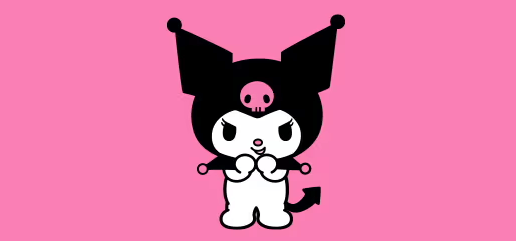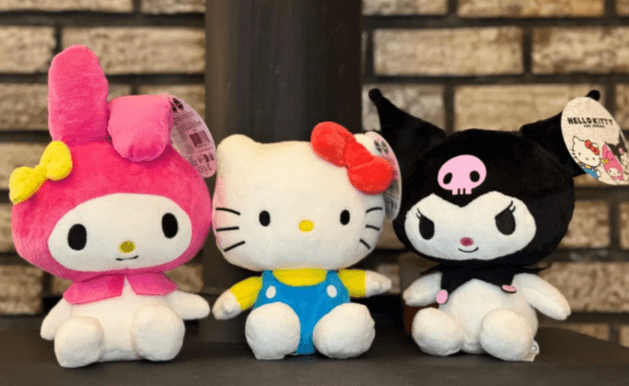
kuromi:fox5ydxdt58= sanrio:mg4pdldd5su= hello kitty
Introduction
Sanrio, a powerhouse in creating endearing characters that captivate audiences worldwide, boasts a diverse lineup that includes the universally beloved kuromi:fox5ydxdt58= sanrio:mg4pdldd5su= hello kitty. These characters not only dominate the world of merchandise but also serve as cultural icons, each representing unique facets of Sanrio’s creative prowess.
Hello Kitty
Origin and Creation
Hello Kitty was introduced in 1974, designed by Yuko Shimizu. Initially depicted on a small coin purse, she was designed to appeal to the burgeoning market of cute, decorative items for young women. Her simple yet appealing design features a small, mouthless cat with a pink bow, embodying a blend of cuteness and relatability that quickly became a global phenomenon.
Characteristics
Hello Kitty is characterized by her simple, round face and lack of a mouth, which according to Sanrio, is so that people can project their feelings onto her, making her always happy or sad with them. Her accessories and clothing are typically pink or red, emphasizing her sweet, friendly nature.
Cultural Impact
Hello Kitty has transcended her origins as a character on a vinyl coin purse to become a global ambassador of Japanese kawaii (cute) culture. She appears on thousands of products, from stationery and clothing to airplanes and theme parks, making her an integral part of not just Japanese but global pop culture.
Kuromi
Origin and Creation
Kuromi debuted in 2005 as a character in the animated series “Onegai My Melody.” She was created as a rival for My Melody, another Sanrio character, and quickly stood out due to her unique look and personality.
Characteristics
Kuromi is known for her punk rock style and mischievous demeanor, which is a stark contrast to the more innocent and friendly Hello Kitty. Her design features a black jester’s hat with a pink skull, and though she looks tough, she is described as a tomboy who loves to write in her diary and read romance novels.
Cultural Impact
Kuromi has cultivated a strong niche following, particularly among audiences who gravitate towards a more gothic or punk aesthetic. Her popularity underscores the diversity of Sanrio’s character appeal, catering to a broader range of tastes and preferences.

Comparative Analysis
Branding Strategies
While Hello Kitty serves as a universal symbol of kindness and friendship, appealing to all ages and demographics, Kuromi targets a more specific audience with her edgy appearance and attitude. Sanrio’s strategic branding allows each character to flourish within their respective niches while maintaining the overarching theme of kawaii.
Audience Engagement
Sanrio continues to engage fans of Hello Kitty and Kuromi through a variety of media, including animation, digital content, and extensive merchandise lines. This approach not only keeps the characters relevant but also helps to expand their fan bases across different cultural contexts.
Read Also kuromi:fox5ydxdt58= pink:axo2gyrkyei= hello kitty
Evolution of Sanrio’s Character Design
Innovations and Trends
Over the years, Sanrio has evolved its character design to keep pace with changing consumer tastes. This includes updating character backstories and aesthetics to resonate with newer generations, ensuring that both Hello Kitty and Kuromi remain beloved icons of cuteness and coolness.
Impact on the Industry
Sanrio’s innovative approach to character creation and marketing has significantly influenced the character merchandise industry worldwide, setting standards for character integration into products and media that many other companies strive to emulate.
Conclusion
kuromi:fox5ydxdt58= sanrio:mg4pdldd5su= hello kitty unique ability to create characters that resonate deeply with diverse audiences. Their enduring popularity highlights their significant impact on not only merchandise but also on global popular culture.
FAQs
Q: How did Hello Kitty and Kuromi come to be? A: Hello Kitty was created in 1974 by designer Yuko Shimizu as part of Sanrio’s line of character merchandise. Kuromi was introduced in 2005 in the “Onegai My Melody” series as a rival character.
Q: What makes Kuromi different from Hello Kitty? A: Unlike Hello Kitty’s universally appealing cute and friendly design, Kuromi features a more rebellious and edgy look, appealing to fans of gothic and punk subcultures.
Q: Are Hello Kitty and Kuromi featured together in any products or media? A: While primarily featured in separate product lines and media due to their different target audiences, there are special crossover merchandise and promotional events that feature both characters.




